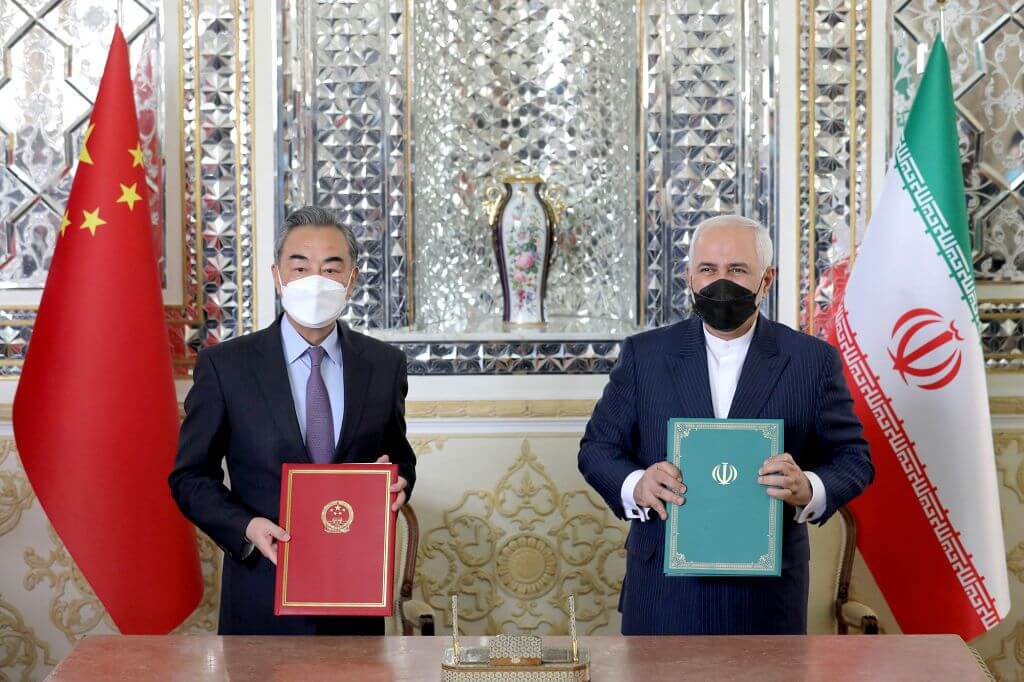On Saturday, China and Iran signed a 25-year “strategic cooperation” agreement, officially titled the ‘Document of Comprehensive Cooperation between the Islamic Republic of Iran and the People’s Republic of China’, which focuses on bilateral cooperation between the two countries in various fields, including economic and cultural ties. The deal was signed during Chinese Foreign Minister Wang Yi’s visit to Tehran, which formed part of his six-nation tour to the Middle East.
The agreement, signed on the 50th anniversary of the establishment of diplomatic ties between Beijing and Tehran, aims to strengthen ties between the two countries. Iranian Foreign Minister Mohammad Javad Zarif referred to China as a friend in hard times and said, “We praise the stances and measures of China at the time of cruel sanctions against Iran.” Similarly, Wang Yi said that they should “continue mutual support on the issues related to each other’s core interests and major concerns.” The deal comes at a time when both China and Iran are respectively on the receiving end of United States (US) sanctions over Xinjiang and nuclear ambitions. Iran has been facing crippling US sanctions since 2018 after former president Donald Trump decided to unilaterally withdraw from the Iran nuclear deal. The current US administration led by president Joe Biden has sought to re-enter the nuclear deal, but has yet to give any assurances over the withdrawal of sanctions until Iran abandons its nuclear ambitions.
The pact with Tehran gives Beijing a major foothold in the Middle East, where it can now expand its flagship Belt and Road Initiative (BRI). According to a report by Reuters, the accord would bring Iran into the BRI and would, in turn, “significantly expand China’s economic and political influence”, which the US sees as a cause for concern. China has emerged as a major backer of Iran regarding the nuclear deal has even called for the US’ “unconditional” return to the Joint Comprehensive Plan of Action (JCPOA). Apart from Iran, the Chinese Foreign Minister is also visiting Saudi Arabia, Turkey, Iran, the United Arab Emirates, Bahrain, and Oman.
In a meeting with Iranian Supreme Leader’s advisor Ali Larijani, Wang Yi emphasised China’s strong support in Iran “opposing hegemony and safeguarding national sovereignty and dignity.” The foreign minister also condemned the unilateral sanctions imposed on Iran and said that they violate international law and cause harm to the Iranian people. Wang Yi also held talks with Iranian President Hassan Rouhani, wherein he said that the China-Iran partnership had withstood the test of the changing international situation. He further stressed that the JCPOA is a multilateral agreement and that the US should not have any preconditions for re-entering the deal.
China has been looking to increase its clout in the region by slowly filling in the void left by the US. Apart from expressing its interest in playing a leading role in resuming the nuclear deal, China has also said that it would be willing to hold peace talks between Israel and Palestine. In fact, shortly before the comprehensive deal was signed with Iran, Wang Yi met his Turkish counterpart, Mevlüt Çavuşoğlu, in Tehran and affirmed Beijing’s growing ties with Ankara.
Iran Signs 25-Year “Strategic” Deal With China
The agreement, signed on the 50th anniversary of the establishment of diplomatic ties between Beijing and Tehran, aims to reinforce bilateral relations between both countries.
March 30, 2021

SOURCE: EBRAHIM NOROOZI/Associated Press
